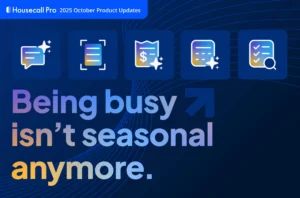Want to win more jobs with less effort?
Grow your business and send quick quotes with our home service software.

Want to see your potential revenue?
See what businesses like yours earn with Housecall Pro in 1 - 2 minutes.

Misinterpretation of your business’ refund and return policy can spell disaster for your customer service, retention rate, and ultimately, the business itself.
It is estimated that between 30-35% of all products ordered online will be returned. What’s more, 67% of consumers will review the company’s return and refund policy before making the ultimate decision to purchase.
A small business return policy is the statement of standard operating procedures for how the business will handle unsatisfactory customer experiences. Return and refund policies are important for any business — whether product- or service-based — because they are binding agreements for how to proceed when unknown future events materialize.
In this article, we cover the benefits, best practices, and a framework for making the decision whether or not to refund, replace, or rework when faced with a customer complaint.
- What is a Return/Refund Policy For?
- Benefits of Small Business Return Policies
- Returns and Refunds Laws By State
- Should You Replace, Refund, or Rework?
- Real-World Return and Refund Policy Example
- Refund Policies for Service-Based Companies
- Return Policies for Product-Based Companies
- Should You Refund a Customer? [Infographic]
What is a Return/Refund Policy For?
A great return and refund policy is one that communicates what actions to expect from the widest range of possible customer experiences and scenarios. When considering what information to include in your return/refund policy you should seek to at least answer the following questions:
Benefits of Small Business Return Policies
Having a buttoned up return and refund policy is important for attracting new customers and retaining current customers.
We mentioned how many customers will check the returns and refund policy before purchasing, but 92% of customers report they will continue to purchase from a business that provided a painless return experience. This is one of the many reasons having great refund and return policy is advantageous for all businesses.
1. Improve customer acquisition
Since many customers will check a business’ return and refund policies before purchasing, having a policy that appeals to these customers can be the difference between the decision to purchase from your business and the decision to purchase from a competitor.
Having a fair return and refund policy for your business does not mean you need to give your product or service away for free, but in the event of an unsatisfied customer, you will do what is necessary to bring forward a solution to their problem. This is what builds trust and reputation, the subject of our next discussion.
2. Build a reputation for excellent customer service
Handling requests for refunds and returns fairly builds trust. If you provided landscaping services to a customer and they are unhappy with the end result, you can consider providing a partial or full refund, or credit for future services. This immediately removes the customer’s feeling of loss aversion, now that they are confident you will make good on their complaint.
In many negative reviews, the complaint is focused on the poor communication or a lack of customer service. Even if your return and refund policy is written to be restrictive towards returns and refund, establishing a reputation of fairness in certain situations overshadow any shortcomings in the policy itself.
In short, handle returns and refunds on a case by case basis to build a reputation of fairness.
3. Increase positive reviews and ratings
There is a lifecycle between your returns and refunds policy and the reviews and ratings of your business.
Having a great return policy incentivizes people to leave good reviews, and good reviews incentivize more business. Those who recognize the importance of positive reviews will also put more emphasis on providing great customer service, which will result in even more reviews and ratings.
Returns and Refunds Laws By State
Depending on the state your business operates, your return policy may have some stipulations that, by law, must be met. Below are some legal considerations for your small businesses return and refund policy:
| State | Law |
|---|---|
| California | Retailers are required to clearly disclose refund policy if not full cash refund, exchange, or store credit within seven days of purchase. Failure to disclose will be forced to refund within 30 days of purchase. |
| Connecticut | Vendors may set their own refund policies and disclose at point of sale. If left undisclosed, the retailer will be forced to accept a return for a full refund. |
| Florida | Businesses that do not offer refunds must disclose this information at the time of purchase. If a business fails to comply, the customer can return for a full refund within 20 days of purchase. |
| Hawaii | Vendors may set their own refund policies and disclose at point of sale. If left undisclosed, the retailer will be forced to accept a return for a full refund. |
| Iowa | No right for customers to cancel contracts or purchase agreements. In other words, all sales are final. If retailers don’t accept returns they must disclose it. |
| Maryland | Sellers must post return policy on the wall, on merchandise, or on the receipt. |
| Massachusetts | Refund, return, or cancellation policies must be disclosed to the buyer before the transaction is complete. If left undisclosed, the retailer will be forced to accept a return for a full refund within a reasonable period. |
| Minnesota | Written notice of refund and return policies must be displayed with 14 point or larger, emboldened font. If not disclosed, cash refunds are required. |
| New Jersey | Businesses must conspicuously post their return policies. If a business fails in this compliance, the customer can return for a full refund within 20 days of purchase. |
| New York | Retailers are legally required to post its refund policy. Failure to disclose will be forced to refund within 30 days of purchase. |
| Ohio | A merchant isn’t required to have any specific refund policy but it must publicize its policy. A customer is entitled to a refund if the policy is not posted. |
| Rhode Island | Unless otherwise communicated or displayed, all sales are final and goods aren’t returnable after 10 business days from purchase. |
| Utah | If the merchant does not refund, exchange, or offer credit, the policy must be clearly displayed at point of purchase. The customer is entitled to a refund if the business does not comply. |
| Virginia | A business must notify customers of its unique return policy in written display unless the merchant provides a cash or credit refund within 20 days of purchase. |
| All Others | No right for customers to cancel contracts or purchase agreements. Refund and return policies are subject to the business decisions of the seller. |
Should You Replace, Refund, or Rework?
Depending on your business, industry, or state, you may need to decide whether to replace, refund, or even re-do the work.
Service-based industries, like home service providers (cleaning, plumbing, HVAC, etc.) may have difficulty offering full refunds for their services due to the high costs associated with a project. However, you must prioritize quality over profit in certain scenarios.
If your team is responsible for property damage, for example, or the finished job did not result in a permanent fix, you must make some tough business decisions to ensure your company’s reputation isn’t tarnished. This could mean replacing a part for free, redoing the work to attempt a more permanent fix, or providing a full refund to the customer.
Let’s cover an example using a hypothetical home cleaning company. A cleaner on your team used the wrong cleaning chemical on a precious Steinway piano resulting in irreparable damage to the piano that will cost thousands of dollars to fix, or hundreds of thousands to replace.
Replacing the piano is out of the question, but you can still compromise and salvage a working relationship by offering to find a solution. Depending on the cost of wood treatment, you could offer to split it or contribute a fair value to that cost. Alternatively, you could offer work in lieu of financial contributions.
Most customers respect businesses that are willing to sacrifice profitability to improve the quality of output.
Real-World Return and Refund Policy Example
Dealing with customer complaints is never an ideal situation. Your customer is upset and likely fears losing their investment in the product or project. It is up to you as the business owner/operator to take away the customer’s fear and make the situation right.
Unfortunately, taking steps to replace, return, or rework doesn’t always end well but your efforts should still be recognized. Transparency is the best policy and is the route taken in the following example:
A customer hired a contractor to install turf for a putting surface on their property. The customer claims to have specifically requested gopher mesh because tunnels cause air pockets that can damage the finished product. The contractor was either unaware or negligent of the gopher mesh specification and subsequently left it out of the contract, which was reviewed and signed by the customer.
After the job was completed successfully — minus the gopher mesh — fear became reality when air tunnels from gophers interfered with the finished product. The customer proceeded to leave negative reviews on Yelp, Houzz, HomeAdvisor and filed complaints with the BBB and CSLB.
The contractor had a decision to make: refund or rework?
In this case, they decided to rip out the turf and leveled dirt in order to lay the gopher mesh to satisfy the customer. The company’s efforts were enough for the Better Business Bureau to close their case.
Although the contractor has a signed certificate of completion from the customer approving the improvements made to the putting green surface, the customer requested the BBB reopen their complaint.
The contractor decided to be as transparent as possible and created an open discussion about the overall customer interaction and postmortem documentation of what transpired. Although the company made the right decision, the outcome was still unfavorable.
Refund Policies for Service-Based Companies
As the example above shows, it’s important for service-based companies to have policies and procedures in place for customers who are dissatisfied with their service or the end result of the project.
Returns are often not possible in service-based businesses which is why owners must consider refunds (both full and partial), replacement, or rework. Below is a flowchart for businesses to use as a framework for making this decision:
Return Policies for Product-Based Companies
The return and refund situations for product-based companies are very different from that of service-based businesses. Whether you are a brick-and-mortar or eCommerce business, returns will cause you to incur costs associated with shipping and restocking or recycling the returned items.
If your product is delivered through a shipping provider, you may also hear from customers who receive broken or damaged goods and unless you insure every package, you will incur additional shipping and replacement costs.
Another potential scenario is a customer claiming the package never arrived. This could mean the package was lost by the shipping provider or the package was stolen after successful delivery. Either way, you are likely to incur costs associated with this unfortunate circumstance.
Below is a framework for product-based businesses to make the decision whether to return, replace, or refund a customer:
Should You Refund a Customer? [Infographic]
It’s helpful to have a framework to make unbiased decisions when considering whether to replace, rework, or refund a customer. Below, we have created a basic framework of considerations you should make before making the ultimate decision.
But it is ultimately your decision. You should weigh the ramifications of not taking action to resolve a customer complaint with the detrimental costs of receiving a large number of returns and refunds.
If you are looking for more helpful tools and decision frameworks to manage your home service business, Housecall Pro has built a suite of tools with features including estimating, booking, dispatching, invoicing, and much more.








